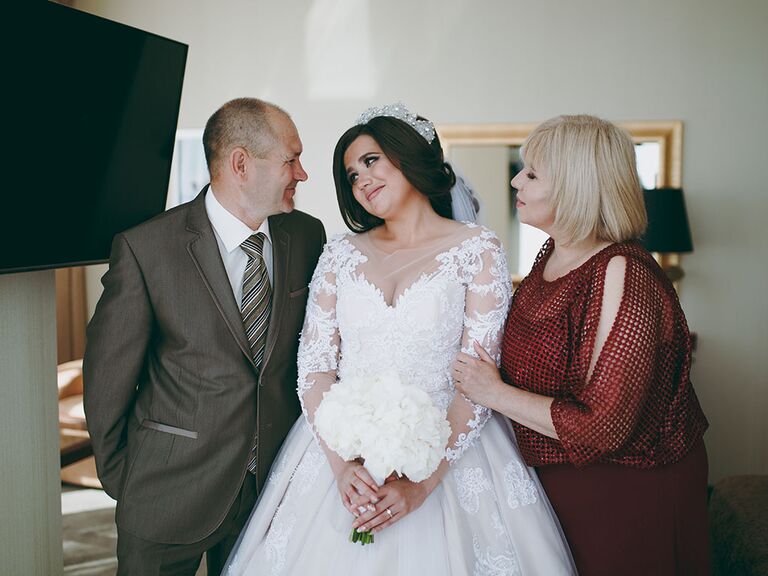How to Plan a Wedding With Divorced Parents

It doesn't take you long after delving into the planning process to realize that putting together a wedding is no easy feat. Not only are you dealing with the complications that arise from combining your two families together, but it can be even trickier when you're dealing with one or two sets of divorced parents. Considering some 40 to 50 percent of all marriages end in divorce, according to the American Psychological Association (APA), you're far from alone in this experience.
New England-based wedding photographer and owner of By Halie Wedding Photography, Halie Child, sees couples from divorced families get married all the time and has learned a thing or two about the best ways to handle the dynamic. "Today's couples grew up with a parental generation that has a fairly high divorce rate," she says. "And, as a result, many of today's couples have divorced parents at their wedding and are navigating how to plan their wedding given their particular family dynamics."
In this story, we'll cover everything you need to know about planning an epic, unforgettable wedding that is inclusive of everyone in your family.
In this article:
- Who Pays for the Wedding If the Parents Are Divorced?
- How to Seat Divorced Parents at a Wedding
- How to List Divorced Parents on the Wedding Program
- Do Divorced Parents Walk Down the Aisle Together?
- How to Take Wedding Photos With Divorced Parents
- How to Introduce Divorced Parents at the Wedding Reception
- Do Divorced Parents Dance Together at the Wedding?
Who Pays for the Wedding If the Parents Are Divorced?
While the traditional wedding landscape involved the bride's parents paying for the wedding, the modern-day landscape has shifted quite a bit. In fact, nowadays it's not uncommon for both sides to split the wedding costs, which can make things particularly tricky for couples of divorced parents. For example, in some situations, one parent may refuse, or not have the means to pay what the other parent can in which case we often see the parent with the larger purse strings funds most of the wedding while the other funds a specific piece of the wedding, explains Laura Maddox, owner of Magnolia Celebrates. "This could mean that Mom buys the dress while Dad pays for the rest, or that Dad pays for the photographer while Mom funds the rest," she says. "Ultimately, if they truly just can't communicate then we often see a sum of money being given to the couple and giving them the autonomy to decide how it is spent."
Who pays for the rehearsal dinner when parents are divorced?
Traditionally, the groom's parents pay for the rehearsal dinner but, in the same way things have changed in regards to who pays for the wedding, it's really anything goes when it comes to who pays for the rehearsal dinner. In fact, it's going to largely depend on the dynamic and makeup of each of your families. "We sometimes hear of each set of parents making a contribution to the couple 'for the weekend' overall, leaving it up to the couple to manage their budget and determine how much will be allocated to the wedding day versus their rehearsal events," says Child. "When it comes to money and budgeting in general, it's always best to start planning with an open conversation with each set of parents about potential plans for the wedding and their expected contribution amounts."
How to Seat Divorced Parents at a Wedding
Seating can be especially tricky when it comes to divorced sets of parents, however, with a little advice from the pros, you can pull it off in a way that respects everyone involved.
Where do divorced parents sit at the wedding ceremony?
At the wedding ceremony itself, most wedding professionals agree that both divorced parents be invited to sit in the front row, as it is the wedding of their child. To make the seating arrangements more comfortable, Child suggests using siblings and grandparents as buffers between any divorced parents that might not be thrilled to sit next to one another. "Use reserved seating cards with individual names on them, and have your planner or coordinator place them in the front aisle in a specific order that is predetermined," she says.
Don't be surprised if some parent conflict arises when it comes to who sits where. If this is the case, Child recommends being super clear when it comes to instructions and assigned seating, as most parents will go along with whatever you have pre-determined.
Where do divorced parents sit at the wedding reception?
At the wedding reception, Margaux Fraise, owner of Harmony Creative Studio in Santa Monica, California, and her team typically see one of two scenarios: each parent sits at their own table with distance between them if they do not get along or the parents are seated at the same table with siblings and other family members if they have a cordial or friendly relationship. "For those who have the former situation, a conversation beforehand can only help things," she says. "You can consider if one parent is more sensitive to the idea of 'fairness'—usually, that is the one to have a conversation about placement and seating arrangements first."
How to List Divorced Parents on the Wedding Program
The wedding program is another area where you might initially question how you should be listing and presenting your parents if they are divorced. As Child explains, there tends to be a lot of tradition baked into the concept of a wedding program, but it is your choice to meld with what's been done for decades or do your own unique type of program. She reminds couples that you don't need to adhere to anything that doesn't feel right for the dynamics of your family.
"Some divorced parents may be very cordial and not mind being listed together on the program as the parents of one-half of the couple while others may have a relationship that lends itself to listing each separately on programs—particularly when one parent is remarried and a step-parent should also be noted," she says. "With traditions related to payment and hosting shifting over the years, it's fairly common to see a 'together with their families' header to the wedding invitations themselves." She recommends this style of giving neutral credit to all members of the parenting family.
Do Divorced Parents Walk Down the Aisle Together?
Whether or not your parents walk down the aisle together at your wedding is truly a choice best left up to you and them. Gauging everyone's comfort levels will help you navigate the best scenario for you and your family. "While it could be comfortable for a set of divorced parents to walk down the aisle together, we often see siblings, grandparents, or other family members used to escort any divorced parents that aren't walking you down the aisle," says Child. "It's also becoming increasingly common to see divorced parents sharing the responsibility of walking their child down the aisle—particularly in circumstances where their child feels a closeness to each and wants their divorced parents to equally have this special moment."
How to Take Wedding Photos With Divorced Parents
Wedding photos are keepsakes you'll treasure long after your wedding day has come and gone—and they not only hold a lot of meaning to you, but also to your family. Here are some expert tips for how to take wedding photos if your parents happen to be divorced.
Communicate family dynamic with your photographer.
Child recommends being upfront with your photographer about your family dynamics so that they can best advise you when it comes to creating a family photo list ahead of your wedding day. "Consider which parent would expect to go first when it comes to photos, and take into account the number of family members and photos for each 'side,'" she says. "If one parent is remarried with more children from that marriage, it may make sense to do the photos with your other single parent first — those photos will be quicker to capture with less people and that parent won't need to wait and watch their ex's new family longer than necessary."
Gauge your parents' comfort zones.
In addition to talking with your photographer, you should also talk with your parents to understand what they are or are not comfortable with. It's possible that your parents may prefer a portrait of their whole family despite them now being divorced, however, they may prefer to keep everything separate as a reflection of the way things are today. "Siblings are a great barrier between any parents that need to be on the same side of the couple in one photo, but wouldn't necessarily want to stand directly next to each other," says Child.
Ask a neutral family member for help.
No matter how you intend to pull off family photos, Fraise suggests designating a helpful family member to assist on the wedding day. "Your photographer and planner will thank you—they have systems, but they don't know who these people are or recognize them by face like other family members can," she says. "Put a helpful aunt or cousin in charge of finding family members and helping to line them up on the wedding day and get together with this person beforehand to let them know which order is best for keeping warring factions away from each other."
How to Introduce Divorced Parents at the Wedding Reception
When introducing divorced parents at your wedding reception, the main priority should be to respect both sides of the aisle. Despite their marital status, they are still your parents, so you can simply have them introduced as "the mother and father of the bride." "Using this kind of language can help to avoid any potential awkwardness or discomfort, and ensure that both parents feel respected and included," says Mary Angelini, Florida-based videographer at Key Moment Films.
When making introductions, Angelini recommends being clear and concise and avoiding being too wordy or detailed when it comes to their past or current relationship. "Instead, keep the introduction simple and straightforward, focusing on the present moment and the wedding celebration," she says.
Do Divorced Parents Dance Together at the Wedding?
Whether or not divorced parents should dance together at a wedding is a highly personal decision, notes Angelini, that truly depends on the relationship between the parents. "If the parents are comfortable dancing together, it can be a beautiful and meaningful moment for the couple and their families," she says.
The best way to play this card is to ask your parents prior to your wedding whether or not they would be comfortable with dancing together. "Respect their feelings and do not pressure them; if they are open to the idea, discuss with them the song they would like to dance to and any other details," says Angelini. "Once the parents have agreed to dance together, plan the logistics of the dance and make sure to communicate the details with the parents so everyone is on the same page."























